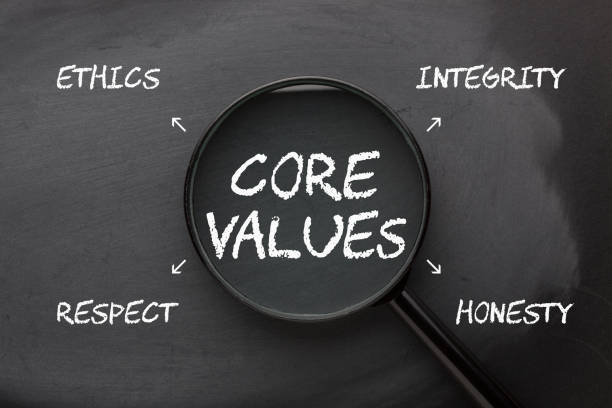Hopefully, by now you have figured out your why and have taken a deeper look at who you are as a person (your identity). If not, please go back and check out parts 1 and 2.
If I were to ask you, what are your top 5 core values, could you do it? Could you confidently explain the difference between your values, priorities, and your goals? It sounds easy, but when I start to go through this with clients there is usually some confusion.
My goal today is to help clear up this confusion because understanding how your goals flow from what you feel is important (your values) and what you make time for (your priorities) will usually dictate whether or not a particular goal is achieved.
So what exactly is a value and how do you determine yours?
Values can be defined as your desired qualities of action or the specific qualities you want to bring to your actions and thus your life.
They describe how you want to live here on earth as a human being and how you want to treat others and the world around you.
Values are about doing, not about what you are feeling. It might be helpful to think of them as a compass that provides you direction.
Values are how you want to behave right here, right now, and at this moment – today, a week from now, a month from now, and 10 years from now.
You can also usually state them in one or two words. For example, being loving, kind, caring, generous, honest, and hard-working are all examples of values.
Conversely, goals are what you want to achieve or complete – or the end result. Ultimately, goals are nothing more than things you do to achieve your values.
They can be long-term or short-term. One of the biggest reasons I see individuals continually falling short of their goals – is because they are not in line with their values.
Now it is possible an individual could be living by their values daily and not end up achieving their ultimate goal. Let’s use marriage as an example. While the actual act of getting married might be the goal, when you strip it all down to values – it could just be that someone values being a loving person.
Therefore, it is conceivable for someone to live their value of being loving and never actually get married. If they truly value being a loving person, they will live this way regardless of the result.
Let’s take this one step further. Again, consider our individual who values being a loving person. It’s pretty safe to say this individual also has other values that are important to them. Perhaps they value hard work which leads to 12-18 hour workdays.
And they also value being kind, caring, and generous. So when they are not hard at work, they spend their remaining time volunteering at their favorite charity. All very admirable. Who could find fault with or what could be the problem here?
Maybe there isn’t any problem at all. I think I’d be hard-pressed to find many who would consider being kind, caring, and generous a bad thing. This leads me to my third and final point.
Our priorities.
Once you determine what is truly important to you, the next step is to look at how you are spending your time. Are you spending it doing things that are important to you or not? If you’re not sure, take a look at your calendar – it usually doesn’t lie.
The amazing thing about priorities is that no matter how crazy or hectic our lives become, we tend to find the time for the things we really want to do.
While our values tend to stay relatively fixed over time, it is not uncommon for our priorities to change or shift. They can shift within a day, during the week, monthly, or even throughout the year.
After all, you can’t do everything at once, hence the need to prioritize.
Sometimes taking care of a sick child is more important than going to work. Sometimes putting in a full day of work is more important than socializing with friends. And sometimes spending the time cooking a healthy meal at home is more important than watching Netflix.
To bring this all full circle, not only do our priorities dictate how we spend our time, but they also define our identity. And our values then stem from the person we think we are or would like to be.
When someone is living in accordance with their identity, values, and priorities – where all three are in alignment, goals are achieved.
So far I have taken the time to write three articles with the hope of helping you achieve more of your health and fitness-related goals but I have yet to even mention the actual process of goal setting. That is important and I will get to it next time.
It would not be accurate to say everything I have discussed up to this point is more important; however, it does serve as the first steps and foundation of the goal-setting process. What I can say is, those who have thought through everything I’ve gone through so far tend to succeed, while those who haven’t tend to give up earlier and more often.
For now, I encourage you to define your personal core values and priorities. Start by writing down the five things that are most important to you. It can be more but shoot for at least five.
Remember values are stated in one to two words. I often see “taking care of my family” listed as a value. If we break that down, we can see at least two values – family/family-oriented, and caring/being caring.
In my opinion, nothing works better than a time journal to determine if you’re spending your time on what you say is important to you. To do this, take out a sheet of paper and simply record what you are doing every 30 minutes from the time you get up in the morning until the time you go to bed. Again, your calendar doesn’t lie.
For those of you with iPhones, you can also go into your settings and click on Screen Time. There you will find with complete detail what you are doing while on your phone, and thus, how you’re spending much of your time.

